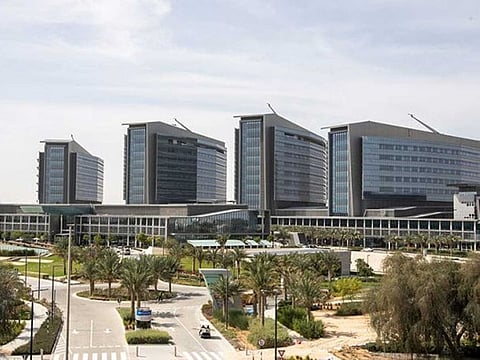Abu Dhabi’s Sheikh Shakhbout Medical City treats rare thoracic condition
Myasthenia gravis is an immune disease affecting one out of 500,000 people worldwide

Dubai: Sheikh Shakhbout Medical City (SSMC), one of the UAE’s largest hospitals for serious and complex care and a joint-venture partnership between Abu Dhabi Health Services Company (SEHA) and Mayo Clinic, has successfully completed a minimally invasive procedure to treat a patient’s chronic and exceptionally rare thoracic condition.
Dr. Edward Black, Thoracic Surgery Consultant atSSMC, said: “Manal Abdelhadi, a 28-year-old female patient diagnosed with a rare autoimmune disorder called myasthenia gravis, was in search of a minimally invasive approach to treating her disease. Because myasthenia gravis is very rare, with a prevalence of approximately one out of 500,000 people affected worldwide, the patient faced difficulty locating a facility within the UAE that offered this technique.”
Immune disease
Myasthenia gravis is an immune disease characterised by weakness and rapid fatigue of any of the muscles under voluntary control and is caused by a breakdown in the normal communication between nerves and muscles. It is more common in women younger than 40 and in men older than 60.
The autoimmune disease attacks specific neurotransmitter receptors that bridge nerve endings and muscle tissues. Patients can also have trouble eating and even breathing in severe cases, which often results in them having to go to Intensive Care. The condition can be managed with a robust treatment plan deriving a mix of medications including steroids, immunosuppressants, plasmapheresis (washing the blood) and surgery to completely remove the thymus gland.
Normal results
The normal results of surgery see approximately a third of patients cured, a third improved by surgery and a third who unfortunately find no improvement. Surgery requires thorough removal of not only the thymus gland but also all of the possible sites of anomalous growth of the gland. It is this latter fact that means the surgery needs to be extensive, at least on the inside of the chest in order to get the best chance of a cure.
Abdelhadi said: “I had a really difficult time during my initial diagnosis and treatment. It became important for me to get surgery quickly, but the options I was given at the time were limited. It was by pure luck that a friend referred me to Dr. Black and his team at SSMC.”
Full activity
“This minimally invasive technique resulted in Manal only having to stay in the hospital for one night. She also benefited from less post-operative pain, faster recovery from surgery, and a quicker return to full activity,” Dr. Black said. “We were extremely pleased at the outcome of the procedure and that she did not have to look further than our UAE boarders to receive the care that she needed. The results of surgeries for this disease usually take time to become apparent as it is an immune disease. Our patient had the best kind of operation and healed very quickly,” concluded Dr. Black.
Sign up for the Daily Briefing
Get the latest news and updates straight to your inbox










